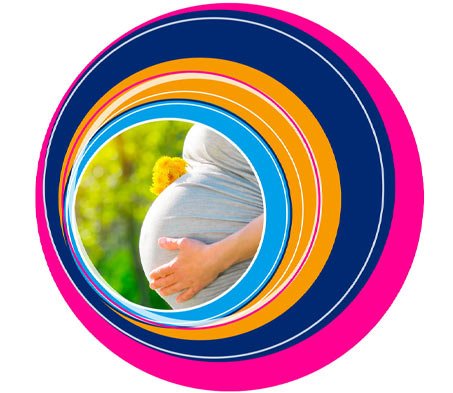
Pregnancy
Vitamin B12 deficiency can considerably affect your ability to conceive or carry a healthy baby to term. If you’ve had trouble conceiving, or lost pregnancies through miscarriage, you should have your vitamin B12 levels checked – please also see our Male and female infertility page.
Research
Research shows that women who begin pregnancy with an already depleted level of Vitamin B12 (low or very low serum cobalamin) will give birth to babies who will also have a higher chance of being Vitamin B12 deficient too. Infants are likely to develop deficiency symptoms during the first few weeks or months after birth.
Why is vitamin B12 important during pregnancy?
When mothers are deficient in B12, the damage to their babies starts in the womb. You’ve probably heard of neural tube defects (NTDs), which are very common severe birth defects occurring when the brain or spinal cord fails to form correctly.
Low levels of folate (Vitamin B9) increase the risk for NTDs, which is why doctors now suggest that you supplement with folic acid. However, research strongly suggests low B12 levels as a factor in NTDs, which isn’t surprising, since folate and B12 work hand in hand.
If you are already aware that you cannot tolerate folic acid, you might need an alternative form of folate such as methylfolate or folinic acid (vitamin B9) to prevent the risk of NTD during your pregnancy.
I’m pregnant and vitamin B12 deficient – What should I do?
The demands of pregnancy on a B12 deficient person can be huge. Your growing baby will take all the B12 supplies it needs, leaving you as the mother desperately short. Many doctors still incorrectly believe B12 injections are unsafe in pregnancy when the opposite is in fact true. Your B12 deficiency is as important as a folate or iron deficiency and should be treated as such.
Some manufacturers of hydroxocobalamin (Vitamin B12 injections) state that you should ask your doctor or nurse for advice before being given B12 injections. This can cause more worry and confusion for you as a mother and a reluctance to treat in a doctor who may be lacking correct or up to date knowledge of this condition.
Please make sure that your doctor understands that treatment for B12 deficiency must continue throughout your pregnancy. B12 injections are non toxic, they have been in safe use for over 60 years and cannot be overdosed.
To keep you and your growing baby healthy during your pregnancy, it’s advised that you also avoid using nitrous oxide during labour. This gas can completely inactivate any remaining supply of B12, which can further malnourish you and potentially affect your newborn.
Pregnant women at greatest risk for Vitamin B12 deficiency include vegans and vegetarians, those with autoimmune pernicious anaemia, or malabsorption syndromes such as Crohn’s disease or coeliac disease. Those with a history of gastric bypass for weight loss, those on restrictive diets, and those with anorexia, or bulimia are also at a greater risk.
If you’re struggling to conceive, read more about B12 deficiency and Infertility here.
If you would like personalised help, I’d be more than happy to chat.
Mothers with depleted B12 stores...
Babies who are exclusively breast fed by mothers with depleted stores are at great risk for developmental disability. This is a common cause of B12 problems in infants.
Vegetarian and vegan mothers must ensure they are getting enough B12 in order that their children do not suffer harm due to B12 deficiency. The tragedy is that many doctors fail to screen pregnant and nursing mothers for vitamin B12 deficiency which can then lead to misdiagnoses of intellectual disability or autism, when the infants lose their speech, social skills and motor skills.
B12 deficiency and miscarriage: Far more common than Doctors think...
Text below reproduced with permission from Sally Pacholok R.N and Dr Jeffrey Stuart’s book ‘Could it Be B12?’
“A recurring theme in medical literature is that B12 deficiency is a fairly rare cause of miscarriage or stillbirth. The evidence, however, suggests otherwise. One recent study, for instance, compared thirty-six women who’d suffered recurrent foetal loss to forty women who’d carried healthy babies to term. The researchers found that 31 percent of the women who’d lost several babies had high homocysteine levels. (Elevated homocysteine is caused by low levels of folate, B12 and/or vitamin B6, and is easily treated with these vitamins).
Sixteen percent of the women who’d suffered recurrent foetal loss carried two copies of the MTHFR gene that causes abnormally high homocysteine levels, and three of the women had overt B12 deficiency. “
Tests that could save a mother's sanity and a child's life...
Text below reproduced with permission from Sally Pacholok R.N and Dr Jeffrey Stuart’s book ‘Could it Be B12?’
“More research is needed to determine the incidence of B12 deficiency in women with post natal depression or post natal psychosis. In the meantime, we believe that all women diagnosed with post natal mental illness should undergo screening, including serum B12 and urinary MMA tests. Pregnancy can dramatically worsen a pre-existing B12 deficiency, because B12 is transferred to the growing foetus throughout pregnancy, and prenatal vitamins contain only six micrograms of this nutrient (compared to the 1,000 micrograms needed to treat deficiency). Pregnant women at greatest risk for deficiency include vegans and vegetarians, those with autoimmune pernicious anaemia or malabsorption syndromes such as Crohn’s disease (an inflammatory intestinal disease) or coeliac disease, and those with a history of gastric bypass for weight loss, strict dieting, anorexia, or bulimia. However, any women who develops symptoms of mental illness following pregnancy needs B12 screening.”
Please find relevant medical journals on Vitamin B12 deficiency and infertility, post natal depression and foetal development.
Simply watching the first 5 minutes of this documentary film will make it clear just how serious B12 deficiency is and how misdiagnosis can occur.
If I've helped please consider buying me a coffee/leaving a virtual tip.
Doing this helps me to offer this free website to you and others around the world.
Thank you, I really do appreciate it.
